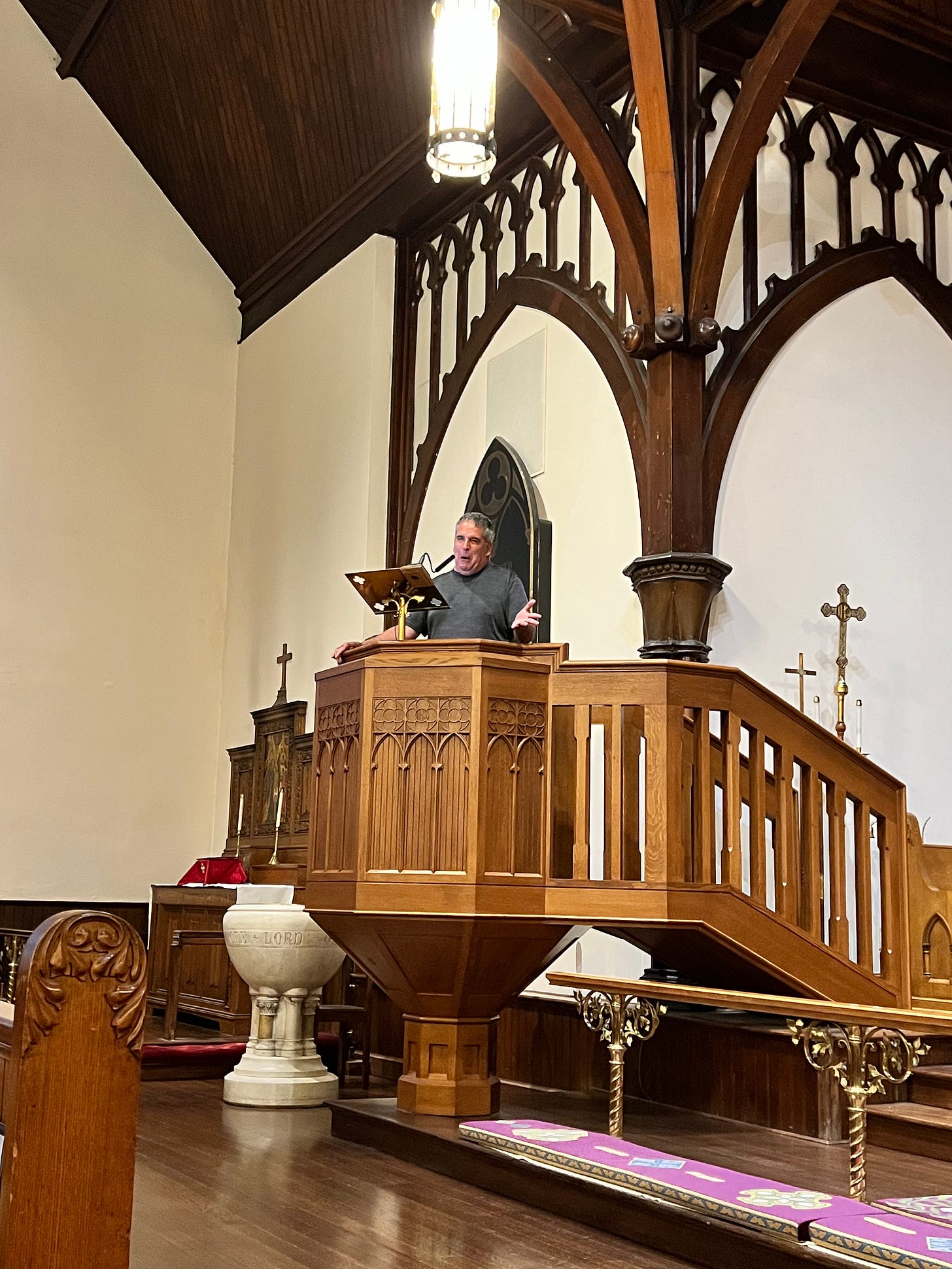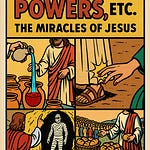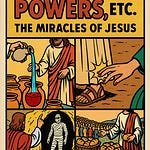Romans 8.17
Here is the sermon I offered for the “Preaching Slam” at the final gathering of the Iowa Preachers Project at Christ Episcopal Church in Charlottesville, Va. I was preceded by four very fine, faithful sermons by colleagues on the preceding verses of the lectionary epistle for Pentecost. Getting to know the members of the cohort this year has been a joy and a blessing. If I had a real job, I’d gladly sit as a lay person under Taran, Dennis, and Chip’s proclamation. And being reacquainted with a classmate from Princeton in Sarah Hinlicky Wilson is grace.
FYI:
Every sermon is delivered to particular ears.
In this case, this is a sermon primarily for preachers.
I wish to begin with an ending.
Ignatius Hazim was born in 1921 in a village near the city of Hama in Syria. The son of devout Arab Orthodox parents, Ignatius discerned a call to preach as a young boy. After having served for decades as an Orthodox priest, Ignatius became the Patriarch of Antioch in 1979. Just four years before his consecration, the World Council of Churches invited Father Ignatius to deliver a talk at their assembly in Nairobi. At the conclusion of his lecture, Father Ignatius proclaimed the following benediction:
“Without the Holy Spirit:
God is far away,
Christ stays in the past,
The church is simply an organization,
Authority is a matter of domination,
Mission is a matter of propaganda,
The liturgy is no more than an evocation,
Christian living is a slave morality,
The Gospel is a dead letter,
And preaching is futile.
But with the Holy Spirit:
The cosmos is resurrected and groans with the birth-pangs of the kingdom,
The risen Christ is here,
The church shows forth the life of the Trinity,
Authority is a liberating service,
Mission is Pentecost,
The liturgy is both memorial and anticipation,
Human action is deified,
The Gospel is living and active,
And preaching is the word of God.”
Without the Holy Spirit, preaching is worse than futile.
It’s dangerous.
In 2011, on the lips of Ignatius of Antioch, the gospel made enemies. The promise provoked conflict. Though he was an elderly man, the patriarch received attempts on his life simply due to his persistence in proclaiming the Prince of Peace at the advent of the Syrian Civil War.
If we are without the Spirit, then for our own good, we ought— like Jonah— to head to Joppa and board the first boat bound for the opposite end of the LORD’s call.
During the second war in Iraq, one week during Lent the LORD summoned me to preach about the use of state-sponsored torture. Newspapers had only recently begun reporting on the Torture Memos which documented the ghastly abuses at the prison in Abu Ghraib. The images outraged the world. In the face of such revelations, the churches in America were silent. Back then, I was young and brash and I proclaimed what I took to be self-evident. I still have the manuscript on a thumb drive that bears the teeth marks of my son, a toddler at the time.
“Why is the church in America so quiet these days?” I exhorted my hearers.
I let the question linger for an uncomfortably long silence before I continued:
“Why are Christians so quiet about this particular issue? What is the matter with us? Why is the church instead consumed with culture wars. Has the church lost its nerve? Has the church forgotten we worship a crucified Lord? No matter what a person has done or is suspected of doing, once that person is taken into custody, he or she becomes defenseless. The Old and New Testaments alike are clear: abuse of a defenseless person is an abomination in God’s sight. The defenselessness of a fetus is a central argument advanced against abortion. This conviction about defending the defenseless lies at the very heart of our faith. Yet we are silent, as quiet as all his followers who did not shout, “Do not crucify him!”
I did eventually hand over the goods. I delivered a promise. It was a gospel sermon. Nevertheless, as soon as I gave the blessing, a church member assaulted me in the narthex and, sticking his finger in my chest, he hollered at me, “Just where in the holy hell do you get off preaching like that, preacher?!”
I stammered.
“Well, Senator,” I said, “It is Lent and the LORD was tortured to death.”
The Chair of the Armed Services Committee shook his head.
He waved his finger at me, “You tell me, preacher— if Jesus was still alive do you honestly think Jesus would having anything to say about torture and the government?!”
“Um, well Senator, uh…I mean, he was crucified, I think...um...maybe he would have...” I started to say.
He shook his head and waved me off.
“Jesus would be rolling over in his grave if he knew you’d brought that kind of politics into our church! Just where did you get the idea that your liberal politics has any place in the church?!”
“He doesn’t have a grave…it’s empty…” I muttered to myself.
“What’s that?” he asked.
“Never mind,” I said.
He stood there, his hands on his hips, dandruff on his shoulders, waiting for me to answers.
Finally, he repeated his question, “Where did you get the idea that kind of politics has any place among believers?!”
I stammered, “Uh, I mean, it’s called the Book of Kings.”
He thought I was being cute.
“You better watch out!” he threatened, “I could have you run out of this place!”
“Bless your heart,” I replied.
He narrowed his eyes and held his holler to a whisper, “If what you believe about Jesus leads to such words, then I don’t see how you have any place here!”
And then he shook his now crimson head, motioned for his wife to catch up to him, and then he hurried off. A few weeks after, on Easter Sunday, when he arrived, opened up the worship bulletin and saw that I was the preacher, he turned right around and left the way he had come. By Pentecost a petition for the bishop to send me away had circulated through the congregation. A former chief of staff to the Majority Leader, the Senator knew how to whip votes. It took a distraction called cancer for me finally to forget the names that joined his petition.
Without the Holy Spirit, every preacher’s mouth should stay where Paul left them in Romans 3.19— shut.
Sealed in silence.
To the extent that believers in the mainline churches contemplate Pentecost at all, we tend to make of it either our primal institutional event (i.e., the “birthday” of the church) or the paradigmatic religious event (i.e., the eruption of mystical signs and wonders made possible by the Spirit’s outpouring). But in the context of St. Luke’s two volume narrative, the wind rushing through the upper room, the crackling of the tongues of fire, the startled voices rising outside the temple courts— including the voice of the one who first sang the Magnificat, with its lines about the proud and the powerful being brought low and the rich sent empty away— the signs of Pentecost all reveal the church’s political vocation. The fire and the wind and the wonder point neither to an institutional act nor to a religious experience but to a political event.
The signs of Pentecost all reveal the church’s political vocation.
From his triumphal entry into Jerusalem to his tear-laden lament over the same city, from the cracking of his whip in the temple to the crowd’s revolutionary acclamation of him, Luke’s account of Jesus’s life and death is overtly, unambiguously political. The charge nailed above his cross is the claim that erupts from his tomb. The Prince of Peace is King (of more than the Jews). That so many mistake Christ for his last name rather than his authority over all the world is an indictment of the church’s preaching.
That so many mistake Christ for his last name rather than his authority over all the world is an indictment of the church’s preaching.
For Luke, Pentecost vindicates Christ’s sovereignty and declares the persistence of his kingdom mission. As Peter makes clear in the very first gospel sermon— a sermon that sounds like too few of my sermons— the risen Christ, enthroned now with the Father, has declared war against God’s enemies.
To the bewildered crowd at Pentecost, Peter preaches:
“Being therefore exalted at the right hand of God, and having received from the Father the promise of the Holy Spirit, he has poured out this that you yourselves are seeing and hearing…“‘The Lord said to my Lord, “Sit at my right hand, until I make your enemies your footstool.””
The resurrected Christ has declared war against God’s enemies, and in pouring out the Spirit upon his disciples, he has authorized them as his envoys in this apocalyptic conflict. This is why Peter tells those who sneer at the Spirit, “We’re not drunk, yet; it’s only the third hour of the day.” And then he cites Joel, the prophet who proclaims “a new world order energized by the movement of the Holy Spirit, one which defies and promises to destroy the worldly orders” built on subjugation and exploitation. That which Peter calls in his sermon, “This crooked generation.” For Luke, the coming of the Spirit empowers the followers of the risen Christ— even slaves— to speak with God’s authority precisely in order to speak against God’s enemies.
Pentecost makes good on his mother’s words!
Since January, I have performed three weddings for couples concerned that one of them will be exiled to a gulag in El Salvador— that’s ridiculous. A theologian of the cross, Luther says, calls a thing a thing.
Just so—
Preachers of the cross have a word to bear against a world that builds crosses still.
God created the universe through speech. The LORD called a contrast community by speaking. Jesus Christ “upholds the universe by his word of power.” And whilst he does so, the LORD Jesus is shaking the foundations, trampling his enemies underfoot, and making all things new through the selfsame means.
Words.
Your words.
But if they are merely your words, “we are of all people the most to be pitied."
Get thee to Joppa.
Back in the winter of 2021, just after the insurrection, the preacher Fleming Rutledge sent me a text message:
“If this not a circumstance in which the true church can take only one position, I don’t know what one would be.”
She quickly followed with another message:
“If this is not a time for courage in the pulpit, I can’t imagine what that time would be. From the sermons I’ve watched online, all I have found is studious avoidance of the Big Lie. Jason, you must risk not being liked and take seriously your responsibility to the Lord to preach and teach the truth in this Empire of Lies. If we continue to live in an Empire of Lies and never speak out, never bear witness to the kingdom, never dare to live the difference Christ makes, we simply give lie to Paul’s promise of the Spirit’s presence with us.”
Looking back at my sermons after Fleming grabbed me by my virtual lapels and shook me, I think “studious avoidance” captures my preaching better than “courageous.” I preached as though we are called simply to enjoy Christ’s benefits rather than share his vocation in making the right kind of enemies. I certainly wasn’t bold enough to dare use a phrase like “Empire of Lies.” I was not who she had reminded me that I am to be— who Pentecost makes me.
In her Parchman Lectures on Preaching, Fleming Rutledge diagnoses an ailment afflicting the mainline church.
She writes:
“Sermons tend to be timid. They lack a sense of urgency. Preachers seem to be afraid of too much power. I think mainline preachers have become so reluctant to be mistaken for evangelicals that they have been in full flight in the other direction.”
Or perhaps we fear not power but its aftershocks, the crater it leaves behind.
In that same Upper Room, when Jesus promises the Holy Spirit he promises the Spirit will provide us comfort. Why? Not because he is going away from us (as we abuse that passage at so many funerals), “I am going away, and I will come to you.” The lectionary omits the penultimate verses in the passage. Jesus promises the Spirit will comfort us precisely because Jesus is not absent from us, and his mission is now our vocation. He has no other risen body but the church and no other voice but yours.
You did not choose it.
You were chosen.
And because Jesus is your Brother, you will bear in your body the marks of the LORD.
The Book of Acts does not disagree with the Gospel of John. The LORD pours out the Comforter onto the body of believers, and the Spirit begets proclamation. Luke’s second volume is really nothing more than sermon after sermon after sermon after sermon. Not one of those preachers— Peter and Paul, James and Phillip, Timothy and Stephen— died of natural causes. Those preachers perished in the process of Jesus putting his enemies under his footstool.
Nevertheless, it comes as a surprise when, in the pivot of his epistle, Paul’s exalted language about the turning of the aeons and the new fact of the Spirit takes a hard turn into suffering.
Martin Luther said of this passage, “It were good that this text were written in letters of gold, so admirable is it, and so full of comfort.” Karl Barth calls the passage the “song of the redeemed.”
Yes.
And yet— and yet!
Suffering is the first half of the inheritance:
Part-time pay for full-time work.
A congregation that refuses to welcome children— maybe even your own adoptive children.
Being taken advantage of by the powers that oversaw your mission posting.
A job you thought was in the bag but didn’t pan out.
Serving a tradition that would not allow you to preach in this space, a denomination other than your own.
Wondering where everyone is on a Sunday morning
Receiving a congregational call but finding no place to call home.
Burying people you’ve come to love.
Sometimes the church blows, and not in the good way.
Suffering is half the inheritance.
A few years after he whipped up votes to have me sent away, he came to me wanting to be baptized. The LORD had not saved him through water and the Spirit, and he was at an age where it nagged at him. In the intervening years, I’d grown on him, and he had learned to trust me. We were talking about baptism in my office, my print of Karl Barth before an empty tomb hanging behind his head, when all of a sudden he changed the subject.
He took off his glasses.
He rubbed his bald head with his sleeve.
“I can’t explain how it happened. And I can’t point to when it all changed for me. But somehow— somehow— I just started to hear the LORD speak to me through you.”
“Thank you?” I said, unsure how to respond.
“It wasn’t a compliment,” he replied, “I still often don’t like what I hear, but I can recognize when God’s got me beat.”
And then regret washed over his face, “I’m sorry for how I treated you before, but maybe there was no other way for God to bring us together. After all, I’ve been on the wrong side of some fights for sure.”
Notice—
In announcing the decisive turning of the ages in Jesus Christ, the apostle Paul’s argument functions by positing a double opposite to the Spirit, “flesh” and the “law.” The “law of sin and death” just is “the Law” absolutely. But “the Law” is also a mode of God’s word.
That is:
The Law is opposite to Spirit.
The Law is God’s first word.
Just so, in this argument the Spirit includes— the Spirit is synonymous with, equivalent to— what Paul elsewhere calls “promise” or “the gospel.” In other words, the Spirit is the power of the promises you have been called to hand over. The Spirit is the power of the gospel you have been summoned to proclaim. The Spirit is God’s second word. Here at the pivot point in his epistle, the apostle Paul uses Spirit language to repeat what he announced at the outset, “For I am not ashamed of the gospel, for it is the power of God.”
The Spirit in Romans 8 is synonymous with “promise” or “the gospel.”
The word about Christ, the word which picks fights but contains no condemnation, is the Holy Spirit. Those who have heard the gospel may therefore know they are in the Spirit. And those who have proclaimed the gospel, even in imperfect, hamfisted ways, may know that they are in the Spirit. Even when you have handled the promises clumsily, even when your words landed off target, even when you hedged and held back because you love your listeners too much to tell them the truth— even then— you were nothing less than the tongues of fire that fell in the Upper Room.
The gospel is the power of God because the gospel is God.
It is the Holy Spirit.
The Spirit is what makes for compelling preaching!
Not compelling preachers!
So relax!
You are simply mouth houses, the lips on Jesus’ risen body.
Do your labor, yes.
Do you labor— there’s a reason it’s called “delivery.”
Do you labor, but trust the Spirit’s work.
Look— let’s keep it real.
On the one hand, all of us are ridiculous candidates for an impossible task of which suffering is one half of the reward. I have only known Chip Wilson since September but he is a nice, thoughtful guy. And therefore he is not who I would choose to shake the foundations of the old world. R.J. and Jay are Episcopalians. Their people built that old world. You would not draft them to trample Christ’s enemies underfoot. Kallie has to work just to legitimate her call to her hearers. Taran has a superhero name but he’s just a father with a baby at home. Lara has more to juggle than can fit neatly into plastic pantry containers. John insists on doing all of life in Dad-pants— and just look at that mustache; you’re going to choose him to make all things new? The words that spring forth from Ken Jones’ mouth and fingers are very often the way he makes unintended trouble for himself. You’re going to trust him with the word of power and match him against God’s enemies?
On the one hand, you are all absurd candidates for such a political vocation.
And that absurdity extends to all who listen to you.
On the other hand, you really have nothing to fear. You have no reason to pretend to be anyone else. And you have no cause to doubt that you are up for the task. Because greater is the One who is in you than you will ever be. And he is greater than the Enemy who is still afoot in the world. That Greater One just is the promise you’ve been handed to proclaim.
Greater is the One who is in you than you will ever be!
Trust it!
Trust the power of the Holy Spirit.
Faith can save preachers too.
Hear the good news:
Though your sermons will falter and your voices will crack and your courage will tremble in the dark—the tongues still burn!
Though your manuscript may shake in your hand and your heart may pound like a hammer in your chest—you have the Holy Spirit of God!
Yes, the world is crooked, and the days are mean.
But the Spirit is not discouraged.
You may be exhausted, but Spirit does not tire.
You may hedge your bets and pull your punches, but the Spirit does not flinch.
That same Spirit who brooded over the waters,
Who whispered the galaxies into being,
Who thundered down at Sinai,
Who overshadowed Mary’s womb,
Who raised Christ Jesus from the grave—That Spirit has been given to you to hand over from your lips to a sinner’s earballs.
This isn’t how I would choose to save the world, but the LORD has given his Spirit to you—yes, you!
You with your weary words and your worried minds.
You who doubt whether you are still called.
You who feel like Elijah, alone in the cave or resentful under the tree.
You who preach to empty pews or to hardened hearts.
You who have seen your sermons tossed aside like pearls before pigs.
The fact of the gospel in your mouth is proof
No less than Mary, the Power of the Most High dwells within you!
And the same Spirit that raised Jesus from the dead—
He is raising up your voice— he is.
He is raising up your calling. He is raising up your courage. He is raising up your words.
To pluck up and to plant.
To sow and to harvest.
To kill and to make alive.
So preach!
Skeptics will scoff. Empires will lie.
Until Pentecost becomes Parousia, the Enemy will persist.
But preach!
Not in your own power. Not in your own name. Not for your own glory— dare to be ordinary.
And preach!
Because with the Holy Spirit:
The tomb is empty.
The throne is occupied.
The church is alive.
The promise is sure.
And the gospel is neither futile nor dead.
It is the Word of God.
Just so, this is the LORD’s word to you today.
This is the LORD’s word to you today.
And so is this promise: whatever you suffer for your labor, it is sure and certain that the second half of your inheritance will surpass it beyond all reckoning.














